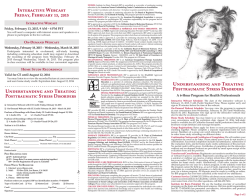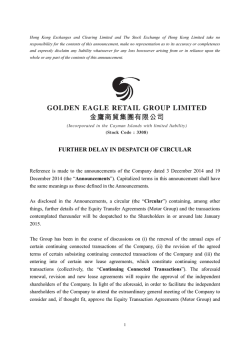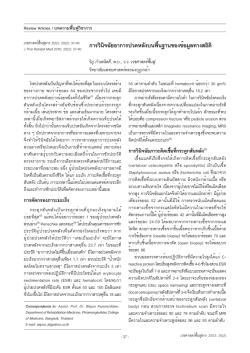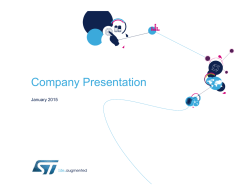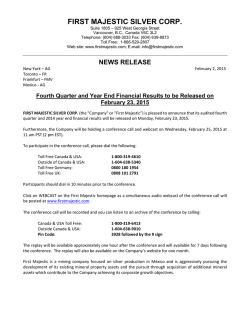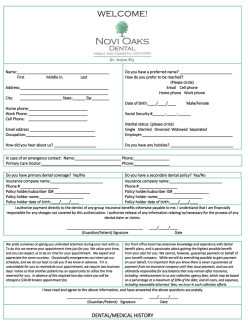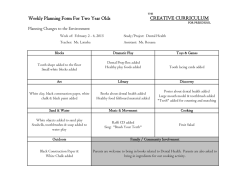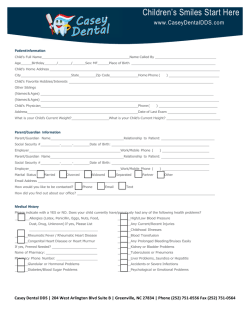
What Is In Our Food: What Is In Our Food
Interactive Webcast Friday, January 30, 2015 Interactive Webcast Friday, January 30, 2015, 9 AM – 4 PM PST You will need a computer with internet access and speakers or a phone to participate in the live webcast. On-Demand Webcast Wednesday, February 4, 2015 – Wednesday, March 4, 2015 Participants interested in on-demand, self-study learning including continuing education credit may register to download the recording of the program from Wednesday, February 4, 2015 through Wednesday, March 4, 2015. The program plus inclass exercises will be available in four convenient segments. Home Study Recordings Valid for CE until December 30, 2017 You may listen to or view the recorded lecture at your convenience and earn home study credit. Expiration date: December 30, 2017 What Is In Our Food one: q Interactive Webcast with CE Credit: Friday, January 30, 2015 q On-Demand Webcast with CE Credit: February 4, 2015 – March 4, 2015 Purchase of Recordings with Home Study CE Credit: through Dec 30, 2017 q 4 Audio CDs or q 4 Audio-Visual DVDs Purchase of Recordings without CE Credit: q 4 Audio CDs, $50 q 4 Audio-Visual DVDs, $75 Tuition is in US dollars. Name (please print) Home Address City/State Work Phone ( Fax ( , ) ) Zip Home Phone ( ) (please print email if available) Email Profession(s) Pre-Registration q $79 Individual Rate q $74 Group Rate (3 or more persons registering together) $89 On-Site Registration (if space is available) 1. Internet: www.ibpceu.com 2. Mail: PO Box 2238, Los Banos, CA 93635 (make check payable to IBP) 3. Fax: (877) 517-5222 4. Phone: (866) 652-7414 Purchase orders are accepted. IBP tax identification number: 77-0026830 Type of Credit Card: q Visa q MasterCard q AmEx q Discover Card # Signature Exp Date / Four Ways To Register NURSES: Institute for Brain Potential (IBP) is accredited as a provider of continuing nursing education by the American Nurses Credentialing Center’s Commission on Accreditation. IBP is awarded “accreditation with distinction,” the highest recognition awarded by the ANCC. IBP is approved as a provider of continuing education by CA Board of Registered Nursing, Provider #CEP13896, and FL Board of Nursing. This program provides 6 contact hours. PSYCHOLOGISTS: IBP is approved by the American Psychological Association to sponsor continuing education for psychologists. IBP maintains responsibility for this program and its content. This program provides 6 hours of continuing education credit. IBP is approved as a provider of CE by the California Board of Behavioral Sciences, #PCE 3743, and by the FL Board of Psychology. This course provides 6 hours of CE credit. COUNSELORS, SOCIAL WORKERS & MARRIAGE AND FAMILY THERAPISTS: IBP, provider #6342, is an NBCC-Approved Continuing Education Provider (ACEPTM) and may offer NBCC-approved clock hours for events that meet NBCC requirements. IBP solely is responsible for all aspects of the program. This program provides 6 clock hours of continuing education credit. SOCIAL WORKERS: IBP, provider 1160, is approved as a provider for continuing education by the Association of Social Work Boards (ASWB), 400 South Ridge Parkway, Suite B, Culpeper, VA 22701. www.aswb.org. ASWB Approval Period: 11/11/2014 – 11/11/2017. Social workers should contact their regulatory board to determine course approval. Social workers will receive 6 clinical continuing education clock hours for participating in this intermediate-level course. IBP is approved as a provider of CE by the California Board of Behavioral Sciences, #PCE 3743, by Florida Board of Clinical Social Work, MFT and Mental Health Counseling, by Ohio CSWMFT Board, Provider #RCST030801, by Illinois Department of Professional Regulation MFT CE Sponsor Program, Sponsor #168.000183, and by TX State Board of Examiners of Marriage & Family Therapists, Provider #830. This program is 6 CE hours. OCCUPATIONAL THERAPISTS: IBP is an American Occupational Therapy Association (AOTA) Approved Provider, #6050. The assignment of AOTA CEUs does not imply endorsement of specific course content, products, or clinical procedures by AOTA. This program provides 0.6 AOTA CEUs or 6 contact hours. Content Level: Intermediate. Content Focus: Domain of OT, Areas of Occupation and Occupational Therapy Process, Outcomes. The interactive webcast is not eligible for AOTA credit. This course is approved by the FL Board of Occupational Therapy for 6 hours of credit. SUBSTANCE ABUSE PROFESSIONALS: IBP is approved by the NAADAC Approved Education Provider Program, Provider #751. This program provides 6 CEHs. PHARMACISTS: IBP is accredited by the Accreditation Council for Pharmacy Education as a provider of continuing pharmacy education. The interactive webcast is an knowledge-based activity with UAN:0492-0000-14-044-L04-P. The on-demand webcast and home study CDs/DVDs are knowledge-based activities with UAN: 0492-0000-14-045-H04-P. Initial Release Date: 12/30/2014, and Planned Expiration Date: 12/30/2017. This program is designated for 6 hours (.6 CEU). DENTAL PROFESSIONALS: IBP is designated as an Approved PACE Program Provider by the Academy of General Dentistry (AGD). The formal continuing dental education programs of this provider are accepted by the AGD for Fellowship/Mastership and membership maintenance credit. Approval does not imply acceptance by a state or provincial board of dentistry or AGD endorsement. The current term of approval extends from 12/01/14 – 11/30/18. Provider ID# 312413. This program provides 6 hours of CE credit. Subject Code: 557. Initial Release Date: 12/30/2014, and Planned Expiration Date: 12/30/2017. IBP, provider RP-4261, is authorized to confer continuing dental education for Dentists, Dental Hygienists and Dental Assistants by the Dental Board of California. IBP is an approved provider with the Florida Board of Dentistry. This program is 6 CE hours. PHYSICAL THERAPISTS: This program is approved by IBP – an accredited approver by the Physical Therapy Board of CA. IBP is an IL Dept. of Professional Regulation Approved CE Sponsor for PTs and PTAs, #216.000210. This program is pending approval by the TX chapter of the American Physical Therapy Association (TPTA). This program is 6 CE hours. The physical therapy boards in AK, AZ, DE, GA, KY, MS, MO, NC, OR, TN, UT, and VA accept courses approved by the PT licensing boards of other States and/or APTA chapters. This course meets the criteria for 6 contact hours of physical therapy continuing education in CT, IA, KS, MO, MT, NE, NH, OR, TN, and WI. MASSAGE THERAPISTS: IBP is an approved CE provider by IL Dept. of Professional Regulation, #245.000045, and by FL Board of Massage Therapy. This course is 6 CE hours. SPEECH-LANGUAGE PATHOLOGISTS: IBP is an approved provider by the CA SpeechLanguage Pathology and Audiology Board (SLPAB), # PDP247, and by the Florida Board of Speech-Language Pathology and Audiology. Only the live webcast and the seminar qualifies for SLP CE credit in Florida. This program provides 6 CE hours. DIETITIANS: IBP is a Continuing Professional Education (CPE) Accredited Provider with the Commission on Dietetic Registration (CDR). Registered dietitians (RDs) and dietetic technicians, registered (DTRs) will receive 6 continuing professional education units (CPEUs) for completion of this program/materials. Continuing Professional Education Provider Accreditation does not constitute endorsement by CDR of a provider, program, or materials. Only the CDs and DVDs of the program qualify for CDR credit. RESPIRATORY CARE PROFESSIONALS: RCPs in New York receive 6 hours of Category III credit through the ANCC. IBP is accredited as a provider of continuing nursing education by the American Nurses Credentialing Center’s Commission on Accreditation. IBP is approved by the California Board of Registered Nursing (CA BRN), Provider #CEP13896, to provide continuing education. Programs offered by the CA BRN approved providers of CE are accepted by the Respiratory Care Board of California. EDUCATORS: Participants completing this program will receive 7.5 clock hours of professional development credit through a cosponsorship agreement between Alliant International University and IBP. Alliant International University’s graduate programs are accredited by the Accrediting Commission of Senior Colleges and Universities of the Western Association of Schools and Colleges. Please contact your school district if you need prior approval for this program. COLLEGE EDUCATED PUBLIC: This program is recommended for individuals who wish to add to their personal and professional knowledge and to improve their health and wellbeing. Participants will receive a certificate of completion for 6 hours. What Is In Our Food: A 6-Hour Seminar for Health Professionals Interactive Webcast Schedule: The date of the interactive webcast is January 30, 2015, 9 AM, Pacific Standard Time. Please register early and sign-in 30 minutes before the time of the webcast. On-Demand Webcast Schedule: You may view the program in segments at your convenience from Wednesday, February 4, 2015 until Wednesday, March 4, 2015. Registrants who sign up for the interactive webcast may elect to take the on-demand webcast. Home Study Schedule: You may listen to or view the recorded lecture at your convenience until the expiration date: December 30, 2017. Self-study credit is available for all California-licensed health professions listed on the brochure except dietitians and massage therapists. Group Registrations: Rates apply for three or more pre-registered guests enrolling together. Please complete a separate registration form for each person. Members of a group can watch interactive or on-demand webcast, or order home study recordings on different dates. Confirmation Notices and Certificates of Completion: We will confirm your registration by email or by letter. Please attend even if you do not receive a confirmation. Successful completion includes full attendance, submission of the evaluation form, and for home study credit, submission of the post-test. No partial credit will be given. Certificates of completion for the interactive webcast and on-demand webcast are provided by email upon receipt of the evaluation form and the post-test. Transfers and Cancellations: Registrants can transfer to another live seminar or webcast if space is available. Registrants canceling up to 48 hours before a seminar or webcast can receive a tuition refund less a $15 administrative fee or an audio CD or DVD recording of the program with the instructional outline for home study credit. Alternatively, a full-value voucher can be obtained good for one year for a future program. In the unlikely event that the program cannot be held (e.g., an act of God), registrants will receive free admission to a rescheduled program or a full-value voucher, good for one year, for a future program. All requests must be made in writing or online. No IBP program has ever been cancelled as the result of low attendance. Customer Service: Call 888-202-2938 to ask about course content, instructors, request accommodations for disability, submit a formal grievance, or remove your name from a list. For other questions, call 866-652-7414. Institute for Brain Potential: We are the leading provider of accredited programs on the brain and behavioral sciences. Our non-profit organization (tax ID 77-0026830) has presented cost-effective, informative and practical seminars by outstanding speakers since 1984. Page 1 of 2 What Is In Our Food FREQUENTLY ASKED QUESTIONS Q: Is there a way to enjoy this program without being at my computer for 6 hours? What if I am not free on January 30, the date of the broadcast? Yes! First, register for the program. You will receive a link to view the program starting February 4 until March 4. The program will be divided into four segments of approximately 75 minutes for userfriendly viewing. Q: What if I have technical issues getting and staying connected, difficulty seeing the slides, or hearing the speaker? We have an expert videographer to capture the sound and slides. We will make copies of the outline available to the participants. Further, in the unlikely event that you have connection problems, IBP will provide registrants with a free set of 4 CDs or DVDs of the entire program. Q: I’d like to view the program and receive credit but without watching the live program or downloading it and still receive continuing education credit. Can I do this? Yes! The cost of the DVD or CD set will be the same as the cost of the live program. Register now, let the operator know you will want the CD or DVD set, and make sure your profession is included in our online brochure. Q: Can I attend this program live? Yes, but only if you live in a city where IBP is currently presenting this seminar. Q: My profession is not included on the brochure. Can I receive continuing education credit? Maybe. Please contact our customer service staff at (888) 202-2938. Q: How long does it usually take to receive a certificate of completion? Typically, within 3 or 4 business days. In this practical program, learn the health risks associated with contaminants in the water, milk, grains, meat and fish, fats and sweeteners, and food storage in the home and hospital and ways to reduce risks. Participants completing this program should be able to name several ways to improve the quality of their: 1. Water, 2. Milk and milk substitutes, 3. Foods beneficial for the GI tract, 4. Meat, poultry and fish, 5. Fats, sweeteners and seasonings, 6. Food additives and preservatives, 7. Food storage, and 8. Home and medical, dental or behavioral health practice. Water •• Fluoride: effects on bone density and osteoporosis; affects on thyroid function; fluorinated water is not indicated for children under the age of two. •• Chlorine: effects in drinking water, when showering or when swimming; assessing risks of asthma and malignancy; benefits of ozone as a substitute. •• Related Toxins: PCBs, pesticides, mold/fungus, volatile organic compounds, dioxin, asbestos, heavy metals, chloroform, and estrogen-modifying substances. •• Commercialized Waters: vitamin water, electrolyte water, sleep water, weight loss water, energy water and stress reduction water, their constituents and false health claims. •• Rating Water Safety: for drinking, cooking and bathing. Milk and Milk Substitutes •• Pasteurized Cow Milk: allergies, osteoporosis and fractures, diabetes, and breast and prostate cancer due to presence of pituitary, steroid, thyroid, and parathyroid hormones; milk and dairy tainted with rBGH, a bovine growth hormone. •• Non-Dairy Substitutes: soymilk and GMOs; rice, almond, and hemp milk; adverse effects of additives and pesticides. •• Probiotics: the human GI tract evolved to adapt to live lactic acid-producing bacteria; the importance of live cultures; benefits of unflavored yogurt with live cultures. Foods and the GI Tract •• Celiac Disease and Gluten Intolerance: gliadin, the most abundant protein in wheat; exorphins that act as opiate receptors. •• Grain Brain: diets high in carbohydrates and protein glycation, a process that increases inflammation via free radicals and oxidative stress; chronic GI inflammation induces brain inflammation. •• Genetically Modified Organisms: animals fed with GMOs in corn and soy and tumors, birth defects and sterility; assessing the human risk. •• U.S. Foods that are Banned Elsewhere: synthetic brominated vegetable oil, olestra, preservatives with BHA and BHT. •• Fermented Foods: how they detoxify and remove a wide range of toxins and heavy metals from the GI tract; a guide to GI-healthy foods. Meat, Poultry and Fish •• Poultry and Eggs: determining use of antibiotics, if chlorine is used to wash the carcass, if there are synthetic hormones and antibiotics, if free range; the meaning of “fresh” and “organic.” •• Beef: grass fed versus grain fed, pasture-raised, and “fresh”; antibiotics and human antibiotic resistance; ractopamine, a feed additive, and adverse effects. •• Fish: wild versus farmed, nutrient value and health; mercury contamination and its enduring aftermath. Fats, Sweeteners and Seasonings •• Addictive Foods: dopamine and reward expectancy, craving and fats, sugars, and salts—junk food and real science. •• Trans Fats: an unsaturated fat, used to increase shelf life and in deep frying; role in coronary heart disease and diabetes. •• Interesterified Fats: semi-soft fat from hydrogenated and non-hydrogenated oils, as an alternative to trans fats, and adverse cardiometabolic effects. •• High Fructose Corn Syrup: metabolized by liver and stored as fat. •• Sugar Substitutes: risks of Aspartame, Saccharin, Stevia, Sucralose versus organic cane sugar, raw honey, and maple syrup. •• Salt: using spices as a substitute. •• MSG: role in glutamate transmission in the brain, risk of transplacental toxic effects in pregnant women, and endocrine abnormalities. •• Glyphosphate: a pesticide, found in corn and soy; packaged foods elevate risk of obesity. •• Titanium Dioxide: in processed salad dressings and coffee creamers, is contaminated with toxic lead and arsenic in rice and cereals. •• Coal Tar Dyes: food coloring, macaroni cheese products and cancer. •• Propylene Glycol: a food preservative and allergies. •• Ethylene: petroleum-based product to ripen tomatoes. •• Harmful Preservatives: BHA, BHT, TBHQ, Propyl Gallate, Sodium Nitrite, and Parabens. •• Healthful Preservatives: key role of antioxidants in vitamins. Food Storage •• Styrene: carcinogen when heating Styrofoam. •• Bisphenol A (BPA): found in polycarbonate water bottles and beverage cans, releases zenoestrogens when heated; risk to babies and children. •• Polyethylene: a polymer in plastic bags and containers, and effects of absorption in skin; safe food storage practices. Home and Health Environment •• Antimicrobial Soap: triclosan and skin absorption, including antibiotic resistance; adverse effects when present in breast milk. •• Bedding: formaldehyde in permanent pressed sheets, triclosan in antibacterial bedding, flame retardants in mattresses, pesticides in cotton sheets and sleepwear; benefits of an organic mattress. •• Dental: effects of fluoride xylitol, toothpastes and mouthwash; beneficial probiotics. •• Cosmetics: tretinoin, used to treat acne and age-related wrinkles, birth defects and risk of leukemia. •• Cell Phones: the link between cell phone use, radiation, and brain tumors. •• Hospital Equipment: polyvinyl chloride plastics (DEHP) in IV tubes, bags and catheters and cardiometabolic and endocrine risks. Guidelines for Risk Reduction •• and Health Promotion •• Helpful Phytochemicals: anthocyanins, polyphenols, ellagic acid, flavonoids, indoles in vegetables and fruit. •• Protective Spices and Herbs: garlic, onions, broccoli, soy, green tea, curcumin, ginger, thyme, rosemary, basil, oregano, and cayenne. •• Risk Reduction Strategies: key alternatives for safe water, milk, foods, food storage, additives, and for healthy homes and work environments. ABOUT THE INSTRUCTOR Dr. Merrily Kuhn received a doctoral degree in Physiology followed by doctorates in Naturopathic Medicine and Holistic Medicine. She has taught graduate programs in pharmacology and complementary medicine and has been affiliated with SUNY at Buffalo. As a practicing Naturopathic Physician, Dr. Kuhn treats a wide range of disorders presented in this program. Food Additives and Preservatives Dr. Kuhn has developed and presented educational programs for health professionals throughout the USA and is one of the nation’s most popular lecturers in continuing education. An outstanding, knowledgeable and humorous speaker, she presents key discoveries from medicine and complementary medicine in clear and practical terms. •• Formaldehyde: a disinfectant and additive to extend shelf life. •• Food Dye No. 2 and 4: red dye in foods, eye shadow and lipstick, aluminum, and severe allergies. In addition to Q & A sessions in class, Dr. Kuhn will answer your questions during the second half of the lunch break and by email after the program concludes. © 2015 IBP Page 2 of 2
© Copyright 2026
